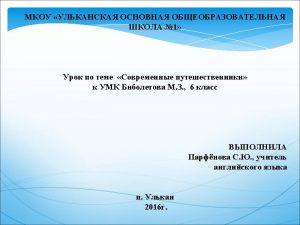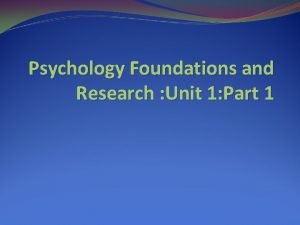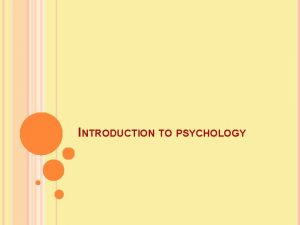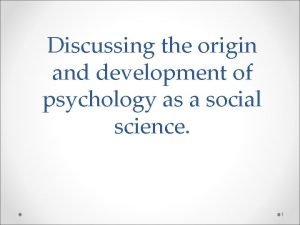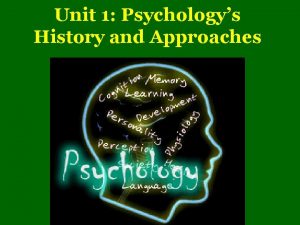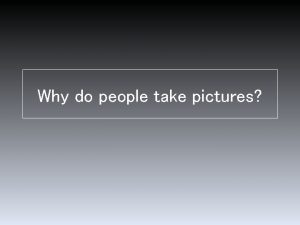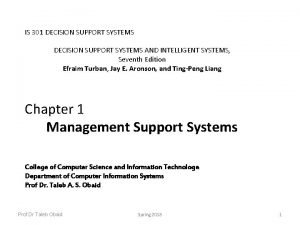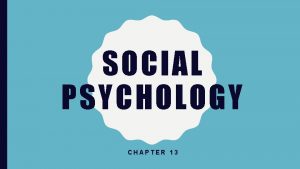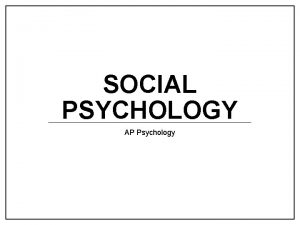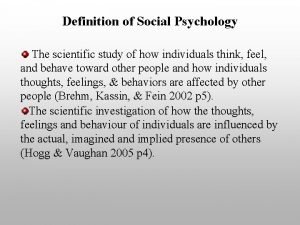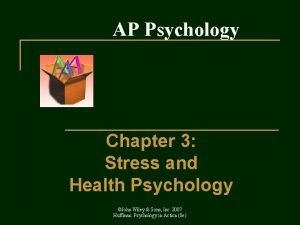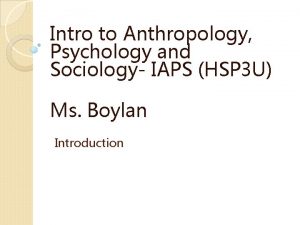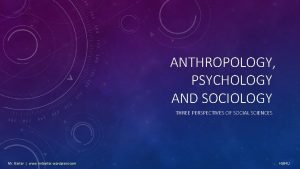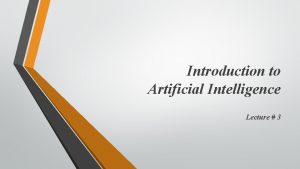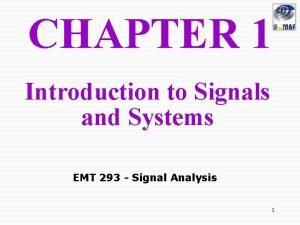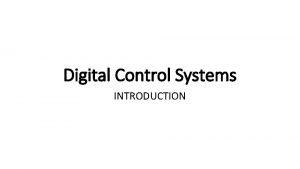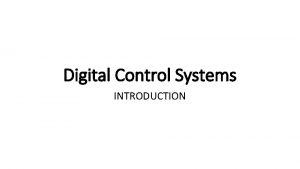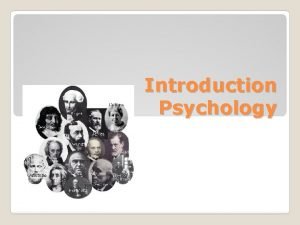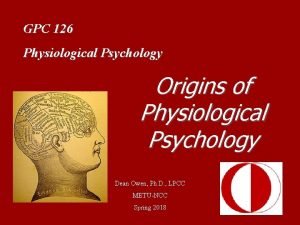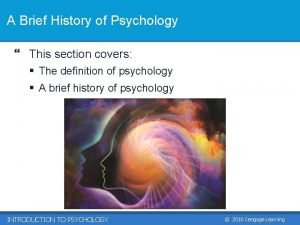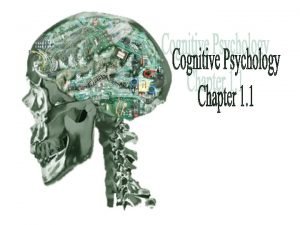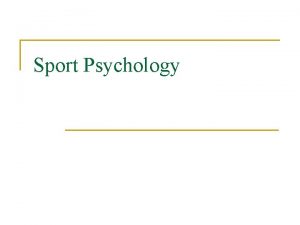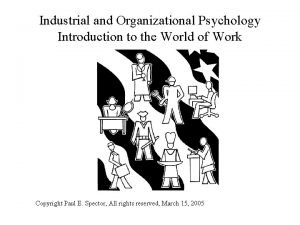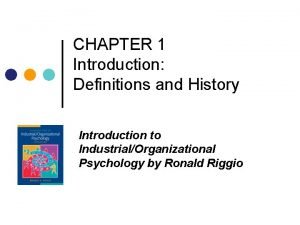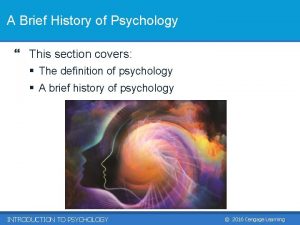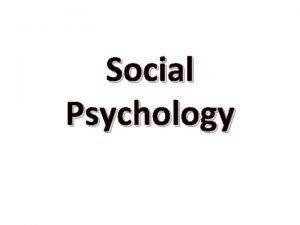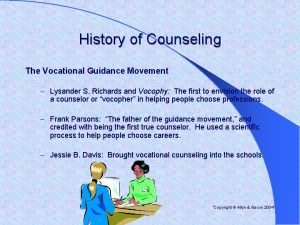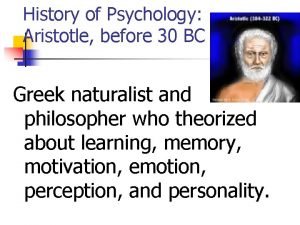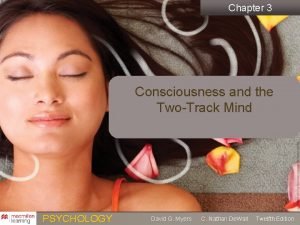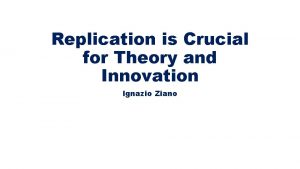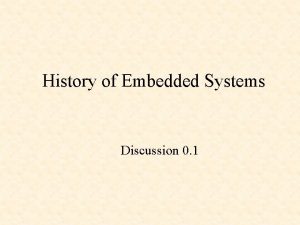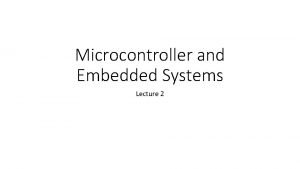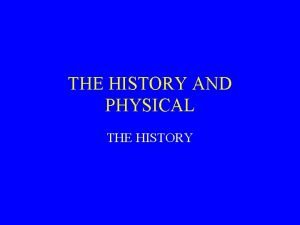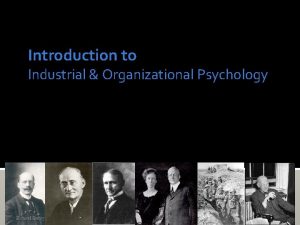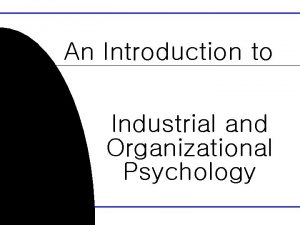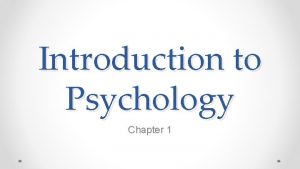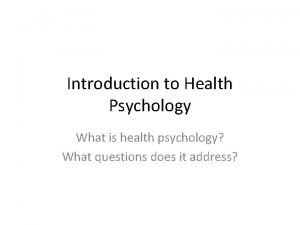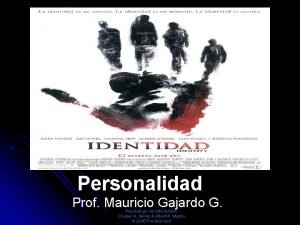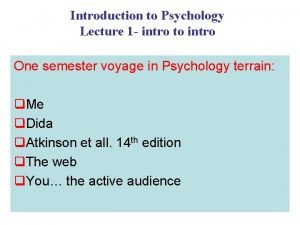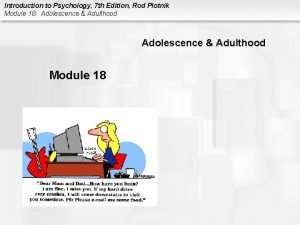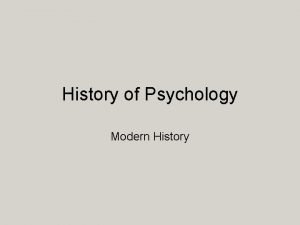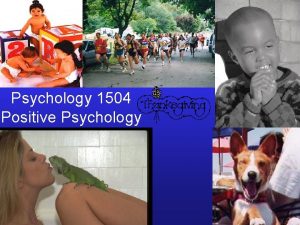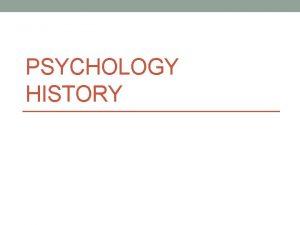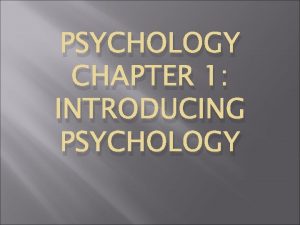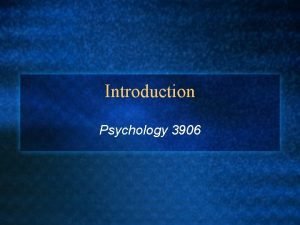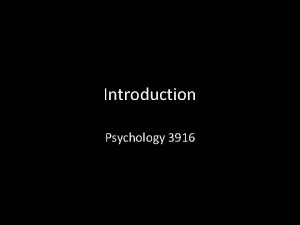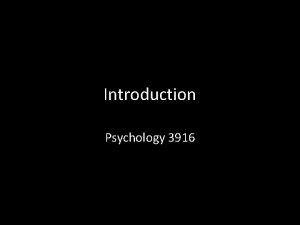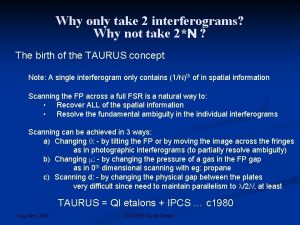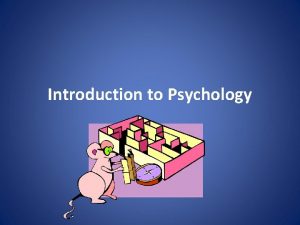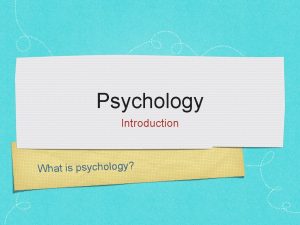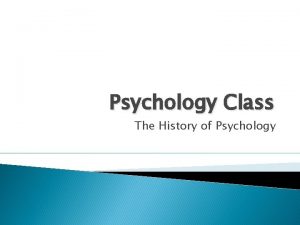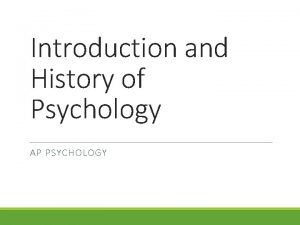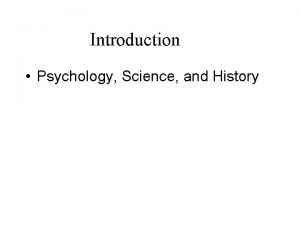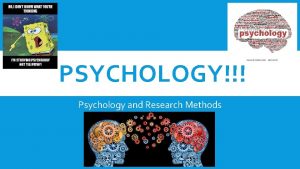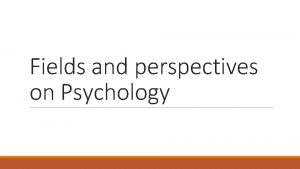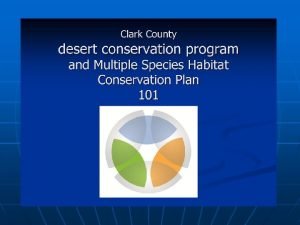Introduction Why Take History and Systems in Psychology


























































- Slides: 58

Introduction: Why Take History and Systems in Psychology?

I. INTRODUCTION A. Questions § Write a brief characterization of each of the following professionals: § § Psychologist, Astrologist, Scientist List the most interesting idea(s) in psychology you have encountered. § § Ideas you found exciting, surprising, or important. How do psychology theories change? § How and why did Psychodynamic, Behavioral, and Humanistic, and Cognitive views of human nature rise and fall over time?

II. IMAGE OF PSYCHOLOGY A. Is Psychology Scientific? § Is your image of psychologists like scientists? § Psychology has been defined in textbooks as the scientific study of the mind and behavior. § § To study people, psychologists, like other scientists, predict and explain behavior. Is your image of psychologists and scientists different or the same? § Astrologist predict and explain of behavior but not scientifically. § § In the eyes of psychology, astrology is a pseudoscience Is your image of psychologists and astrologists the same or different?

II. IMAGE OF PSYCHOLOGY A. Is Psychology Scientific? § The discipline presents itself as scientific. § Psychologists see themselves as scientists and as very different than astrologists § Even psychologists who work in clinics or hospitals often (although not always) see themselves as scientist-practitioners. § § Psychologists are supposed to be practitionerscientists like medical doctor. The activities of psychologists like doctors are based on the best scientific evidence, with no activities being performed without such evidence.

II. IMAGE OF PSYCHOLOGY A. Is Psychology Scientific? § Curiously, Hergenhahn’s textbook defines psychology differently than the standard definition of psychology in textbooks! § § Psychology is defined by the professional activities of psychologists. (p. 2) Why would Hergenhahn define psychology in such a circular and non-standard manner? Two reasons § § § Historical diversity. Professional diversity

II. IMAGE OF PSYCHOLOGY B. Historic Diversity § The definition avoids fixing a permanent meaning of the discipline when viewing it historically. § No single definition of psychology would apply in the history of the discipline. § § Historically psychology was defined as study of the psyche, or mind; the spirit; consciousness; behavior. Historically, psychology has involved different activities historically than it does now. § Professional psychological activity has included examined responses to inkblots to identifying bumps on the head.

II. § § IMAGE OF PSYCHOLOGY C. Professional Diversity The definition acknowledges the range of backgrounds, approaches, and activities of psychologists. What do you think it means that we can not agree about what is interesting, exciting or important? § Does it mean that psychology is in trouble because of the diversity of ideas? § § Guess how many divisions that there are in American Psychological Association? (Divisions) Guess how many journals American PA publishes? (APA Journals).

1. Society for General Psychology 2. Society for the Teaching of Psychology 3. Experimental Psychology 4. There is no Division 4 [more info] 5. Evaluation, Measurement, and Statistics 6. Behavioral Neuroscience and Comparative Psychology 7. Developmental Psychology 8. Society for Personality and Social Psychology 9. Society for the Psychological Study of Social Issues (SPSSI) 10. Society for the Psychology of Aesthetics, Creativity and the Arts 11. There is no Division 11 [more info] 12. Society of Clinical Psychology 13. Society of Consulting Psychology 14. Society for Industrial and Organizational Psychology 15. Educational Psychology 16. School Psychology 17. Society of Counseling Psychology 18. Psychologists in Public Service 19. Military Psychology 20. Adult Development and Aging 21. Applied Experimental and Engineering Psychology 22. Rehabilitation Psychology 23. Society for Consumer Psychology 24. Theoretical and Philosophical Psychology 25. Behavior Analysis 26. History of Psychology 27. Society for Community Research and Action 28. Psychopharmacology and Substance Abuse 29. Psychotherapy 30. Society of Psychological Hypnosis 31. State Psychological Association Affairs 32. Humanistic Psychology 33. Mental Retardation and Developmental Disabilities 34. Population and Environmental Psychology 35. Society for the Psychology of Women 36. Psychology of Religion 37. Child, Youth, and Family Services 38. Health Psychology 39. Psychoanalysis 40. Clinical Neuropsychology 41. American Psychology-Law Society 42. Psychologists in Independent Practice 43. Family Psychology 44. Society for the Psychological Study of Lesbian, Gay, and Bisexual Issues 45. Society for the Psychological Study of Ethnic Minority Issues 46. Media Psychology 47. Exercise and Sport Psychology 48. Society for the Study of Peace, Conflict, and Violence 49. Group Psychology and Group Psychotherapy 50. Addictions 51. Society for the Psychological Study of Men and Masculinity 52. International Psychology 53. Society of Clinical Child and Adolescent Psychology 54. Society of Pediatric Psychology RETURN

General Topics American Psychologist APA Monitor Contemporary Psychology Dreaming European Psychologist History of Psychology Journal of Psychotherapy Integration Psychological Assessment Psychological Bulletin Psychological Methods Psychological Review Psychology, Public Policy, and Law Review of General Psychology Applied & Practice Clinician's Research Digest Consulting Psychology Journal: Practice & Research Dreaming Experimental and Clinical Psychopharmacology Group Dynamics: Theory, Research, and Practice Health Psychology International Journal of Stress Management Journal of Applied Psychology Journal of Consulting and Clinical Psychology Journal of Counseling Psychology Journal of Educational Psychology Journal of Experimental Psychology: Applied Basic Research Journal of Occupational Health Psychology Behavioral Neuroscience Neuropsychology Emotion Professional Psychology: Research and Journal of Abnormal Psychology Practice Journal of Comparative Psychology Psychoanalytic Psychology Journal of Experimental Psychology: Psychological Assessment Animal Behavior Processes Psychological Services Applied Psychology of Men and Masculinity General Human Perception and Performance Psychotherapy: Theory/Research/Practice/ Rehabilitation Psychology Learning, Memory, and Cognition Prevention & Treatment Psychological Methods

Social/Personality, Development Education Theory, Reviews, Methodology American Psychologist Contemporary Psychology Dreaming Journal of Psychotherapy Integration Psychological Assessment Psychological Methods Psychological Review Psychotherapy: Theory/Research/Practice/ American Journal of Orthopsychiatry Cultural Diversity & Ethnic Minority Psychology Developmental Psychology Emotion Health Psychology Journal of Educational Psychology Journal of Family Psychology Journal of Personality& Social Psychology and Aging Psychology of Men and Masculinity Professional Issues, Public Policy American Journal of Orthopsychiatry Consulting Psychology Journal Int. Journal of Stress Management Journal of Counseling Psychology Journal of Consulting & Clinical Psych Professional Psych: Research & Practice Psychological Assessment Psychological Services Psychology, Public Policy, and Law Prevention & Treatment RETURN

II. IMAGE OF PSYCHOLOGY D. Science and Conceptual Change § How and why do psychological ideas about human nature change? § § What caused Psychodynamic views of human nature rise and wane from 1920 s to 1940? Behaviorist views of human nature quickly rose and fell as the scientific account for the discipline. Why? Why led to the rise and fall of Humanistic view of human nature from the 1960 s to 1980 s? What triggered the present pervasiveness of neuroscience account of human nature? Will it last?

II. IMAGE OF PSYCHOLOGY D. Science and Conceptual Change § What process would you expect to underlie conceptual change? § § The Scientific Approach: New ideas emerge out of evidence of the inadequacy of old ideas. The Fashion Approach: New ideas emerge because, like fashion, novelty is intrinsically good. The Death and Replacement Approach: Old ideas fade away as proponents of those ideas die. The Premium of the New: New ideas in psychology are valued, even if not (yet) supported.

III. Why Study the History of Psychology A. Reasons § Text’s Reasons to study History of Psychology § § § Perspective: Appreciate how ideas evolve. Deeper understanding: Realize the broader ideas underlying current issues in psychology Recognition of fads or fashions: Distinguish ideas valued for their social relevance rather than truth. Avoiding repetition of mistakes: Understand unproductive intellectual avenues. A source of valuable ideas: Value old ideas which can become new again (e. g. , unconscious) Curiosity: Identify with one’s discipline’s past.

III. Why Study the History of Psychology A. Reasons § But there may be a 7 th Reason not in the textbook. § Studying the history of psychology will make you more aware of the myths of the discipline. Like any institution socializing its young, undergraduate Psychology courses propagate of myths about the discipline. One myth may be the extent to which psychology is a pure science, not different than physics § § Underlying diversity in psychology is an uniformity of accepting the discipline as scientific. As we will see in the class, the history presents a different story of this.

III. Why Study the History of Psychology B. Keith Stanovich § Stanovich’s How to Think Straight about Psychology is a defense of the discipline as scientific. § Psychologists share the common value of science. § § Science is a way of thinking about and observing the universe that leads to a deeper understanding of its workings (Stanovich, p. 8). Stanovich discusses three characteristics of science § § § Systematic Empiricism: Evidence-based. Publicly verifiable: Ideas are open to scrutiny. Deals with solvable problems: Only testable ideas.

III. Why Study the History of Psychology B. Sigmund Koch § Koch authored a respected history of the discipline then denied it was scientific. § § “Characteristically, psychological events are multiply-determined, ambiguous in their human meaning, polymorphous (multiformed), contextually environed or embedded in complex and vaguely bounded ways, evanescent (temporary) and labile (unstable) in the extreme. ” “Psychology has been misconceived as a science or as any kind of coherent discipline devoted to the empirical study of human beings.

IV. THE COURSE A. Features § This course is designed to help students understand the discipline in new ways § Students will learn about the assumptions underlying modern ideas in psychology (the Systems part) by exploring the conceptual origins and evolution of those ideas (the History part). § § The course runs backwards, tracing back contemporary ideas to previous ideas of earlier times and ultimately to a Greek! It is my hope that the course will arm you will skills to perform an “archeology of psychological knowledge” and sharpen your critical thinking about the disciple.

§ Three Themes in Understanding Psychology: Science, Philosophy, and History

I. INTRODUCTION A. Issues and Goals § Understanding psychology involves adopting three perspectives: § Scientific Perspective: § § Understanding the procedures psychologists use to answering questions in a scientific manner. Historical Perspective: § § Understanding the social, cultural, intellectual, and emotional settings that shaped psychological ideas. Philosophical Perspective: § Understanding the enduring questions about the nature of reality and knowledge addressed by psychology.

I. INTRODUCTION A. Issues and Goals § In this lecture we review each perspective, highlighting central points or issues. § Of interest is how to hold the three perspectives simultaneously when exploring Psychology § § Simultaneous adoption of the scientific, historical, and philosophical perspectives amounts to exploring Psychology from a Philosophy/History of Science point of view. The history/philosophy of science affords a broad appreciation of psychology, its nature, origins, and place in modern society.

II. SCIENTIFIC PERSPECTIVE A. What is Science? § Stanovich defined science as a process: § § Systematic Empiricism: Evidence-based. Publicly verifiable: Ideas are open to scrutiny. Deals with solvable problems: Only testable ideas. But by focusing on process not content, the definition insures that psychology is scientific, § Kant and Galileo (among others) argued that psychology could never become a science because of its focus on subjective experience (e. g. , mental events) § View strongly held as late as the 1800 s, but less than 75 years later, psychology was heralded as a new science and quickly spread into popular culture.

II. SCIENTIFIC PERSPECTIVE A. What is Science? § Science was developed as a way to answer questions about nature. § One issue is whether Psychology has answered any questions using scientific methods? § § Do ideas in psychology just come and go or are they accepted or rejected by scientific means? Did Phrenology (18 th belief that personality traits were determined by "reading" bumps on the skull) fall out of favor because… § § the idea was scientifically rejected OR believers died off and other ideas took its place

II. SCIENTIFIC PERSPECTIVE A. What is Science? § Actually, Phrenology is still with us in the form of the Modularity Hypothesis (localization of brain function) in cognitive neuroscience.

II. SCIENTIFIC PERSPECTIVE A. What is Science? § Science was developed as a way to answer questions without appeal to … § § church dogma (Darwin: Evolutionary Theory) past authorities (Copernicus: Heliocentric Theory) superstition (Galileo: Moons of Jupiter) abstract thought alone (Philosophy) § The unique contribution of science over other methods of arriving at truth is the use of direct observation of nature! § But is the mind something “natural” of which you can have “direct observation”

II. SCIENTIFIC PERSPECTIVE A. What is Science? § Science itself is a combination of rationalism and empiricism (systematic empiricism) § Rationalism – mental operations or principles (rules of logic) must be employed to attain true knowledge. § Empiricism – the source of all knowledge is sensory observation. § Scientific theories are mostly composed of testable propositions and have two functions. § Organize empirical observations. § Provides guide for future observations.

II. SCIENTIFIC PERSPECTIVE A. What is Science? § Theories are evaluated by assessing their testable propositions. § If theoretically derived propositions are tested experimentally and confirmed, then theory gains strength, otherwise theory will be revised or abandoned. § The logic of the test of theoretical proposition is the rational side of science. § The analysis of the data and its use as evidence for or against a theoretically-based proposition is the empiricist side of science.

II. SCIENTIFIC PERSPECTIVE A. What is Science? § But there is more to science than just theories; there are scientific laws. § Law – consistently observed relationship between two or more classes of empirical events which is amenable to public observation and verification. § Two classes of scientific laws: § Correlational laws – how classes of events vary together. § Causal laws – how events are causally related. § Major goal of science is to discover the causal laws underlying natural phenomena.

II. SCIENTIFIC PERSPECTIVE B. Determinism vs. Free Will § One implication of assuming psychology is scientific is also believing in determinism. § Science assumes that what is being studied can be understood in terms of causal laws. § § If true, the assumption suggests that all human behavior can be predicted from causal laws – that we are determined. A scientific account of human behavior appears to support determinism over free-will. § This may an overstatement as complete determinism may not even apply in physics, where there is some indeterminacy (Heisenberg Uncertainty Principle).

II. SCIENTIFIC PERSPECTIVE B. Determinism vs. Free Will § Two general types of determinism. § Psychical determinism – mental causes, conscious or unconscious, of behavior. § § Freudian and cognitive approaches in psychology adopt a psychical deterministic view. Each adopts a view of mental causation in which behavior is predicted and explained by psychological processes.

II. § SCIENTIFIC PERSPECTIVE B. Determinism vs. Free Will Physical determinism – determinants are directly measurable. § § § Biological determinism: emphasizes importance of physiological conditions and/or genetic predispositions in explanation of behavior. Environmental determinism: emphasizes importance of environmental stimuli as determinants of behavior. Sociocultural determinism: emphasizes cultural or societal rules, regulations, customs, and beliefs that govern human behavior

II. SCIENTIFIC PERSPECTIVE B. Determinism vs. Free Will § Psychology can be scientific but reflect indeterminism about human behavior § It may be assumed that human behavior is causally lawful, but the causes cannot be accurately measured. Psychology like Physics may be subject to the Heisenberg Uncertainty principle § § Heisenberg’s principle applied to psychology states that we can never learn at least some causes of behavior because in attempting to observe them we change them.

II. SCIENTIFIC PERSPECTIVE B. Determinism vs. Free Will § Some reject science as a way of studying humans, because behavior is freely chosen, or self generated, reflecting non-determinism. § Free will and personal/moral responsibility § Hard determinism § § Causes function in an automatic, mechanistic manner, thus the notion of personal responsibility is meaningless. Soft determinism § Cognitive processes intervene between experience and production of behavior. Human behavior is result of thoughtful deliberation of options available; thus, a person is responsible for actions.

III. HISTORICAL PERSPECTIVE A. Adopting an Historical Perspective § A historical perspective of psychology provides an understanding of the context in which psychologists work § Focus on the social, cultural, intellectual, and emotional forces that shaped psychologists lives and actions they have taken. § Although we make speak of people of time in terms of uniformity, psychologists may have acted on the basis of conflicting beliefs and ideologies § Understanding diverse perspectives is also a key to historical perspective-taking.

III. HISTORICAL PERSPECTIVE A. Adopting an Historical Perspective § Adopting a historical perspective is very different from the common-sense notion of identification with another person. § Indeed, taking historical perspective demands comprehension of the vast differences between us in the present and those in the past. § Adopting a historical perspective is sometimes called “historical empathy, ” § One must try to understand the actors in past in terms of the social political, cultural and moral context in twhich that person lived!

III. HISTORICAL PERSPECTIVE A. Adopting an Historical Perspective § Hergenhahn addresses three critical issues in historiography: The study of the proper way to write history. § Where to start? § § What marks the beginning of psychology? What to include? § § What is relevant to telling the history? Choice of approach? § What approach to history should be adopted?

III. HISTORICAL PERSPECTIVE B. Where to Start (End)? § Its often said that Psychology is a recent discipline with a long history. § Should we identify the history of psychology beginning with… § § Ancient man’s explanations Early Greek philosophers - theories of cognitive processes When psychology became a separate science – in the 19 th century The textbook starts (ends) with the ancient Greek philosophers

III. HISTORICAL PERSPECTIVE C. What to Include? § The decision to include and exclude material in an historical analysis is critical! § Two kinds of systematic errors § § § Presentism: attempt to understand the past in terms of present knowledge and standards Historicism: study of the past without addressing the relationship between past and present A balance between the two errors seems necessary § The textbook concentrates on individuals who contributed the most to the development of or who has become closely associated with ideas.

III. HISTORICAL PERSPECTIVE D. Choice of Approach? § Four different approaches to writing history § Zeitgeist (spirit of the times) § § Great-person § § emphasizes the works of individuals Historical development § § Zeitgeist (spirit of the times) approach emphasizes the influences of developments in other sciences, political climate, technological advancements, and economic conditions on the development of psychology Illustrates how individuals and/or events contributed to changes and development of ideas and concepts Eclectic approach § combines these three approaches and is the approach used in the book

IV. PHILOSPHICAL PERSPECTIVE A. Introduction § Psychology addresses enduring philosophical questions. § Appreciating the questions is essential for understanding psychology. § § Appreciating the answers is central for grouping theories together into paradigms § § Much of psychology can be understood as an attempt to answer these questions empirically Paradigms are defined as a set of assumptions, concepts, values, and practices that constitutes a way of viewing reality for the community that shares them, especially in an intellectual discipline. Hergenhahn identifies 10 enduring philosophical questions

IV. PHILOSPHICAL PERSPECTIVE A. Introduction § What is the nature of human nature? § How are the mind and body related? § Nativism versus empiricism § Mechanism versus vitalism § Rationalism versus irrationalism § How are humans related to nonhuman animals? § What is the origin of human knowledge? § Objective versus subjective reality. § The problem of the self § Universalism versus relativism

IV. PHILOSPHICAL PERSPECTIVE B. Questions § Q 1 - What is nature of human nature? § § Determine what is universally true about humans Q 2 - How are the mind and body related? § § Materialists: Matter is only reality, thus everything must be explained in terms of matter Idealists: Attempt to explain everything in terms of consciousness Monists: Believe in only one view: either materialist or idealist Dualist: Believe that there are both physical events (materialism) and mental events (idealism). The question is, how are they related?

IV. PHILOSPHICAL PERSPECTIVE B. Questions § Types of dualism § § § Interactionism: The mind and body interact. Emergentism: Mental states emerge from brain states. Epiphenomenalism: Mental processes are byproducts of brain processes. Psychophysical parallelism: Environmental events cause both mental events and behavior simultaneously, which are independent of each other. Double aspectism: Humans cannot be divided into mind and body; they are a unity of experience. Mind and body are aspects of the same person. § § Some dualists propose a pre-established harmony between mind and that is coordinated by an external agent (i. e. God). Occasionalism: When a desire occurs in the mind, God causes the body to act; when events happen to the body, God causes the corresponding mental experience.

IV. PHILOSPHICAL PERSPECTIVE B. Questions § Q 3 - Nativism vs. Empiricism § § Nativism (nature): Emphasizes the role of inheritance Empiricism (nurture): Emphasizes the role of experience. § Most psychologists take the position that human behavior is influenced by both nativism and empiricism § Q 4: Mechanism vs. Vitalism § § Mechanism: Behavior of all organisms can be explained as machines in terms of parts and laws. Vitalism : Living things contain a force that does not exist in inanimate objects (the soul).

IV. PHILOSPHICAL PERSPECTIVE B. Questions § Q 5 – Rationalism vs. Irrationalism § § Rationalism: Emphasizes logical and systematic, thought processes in explanations of behavior Irrationalism: Emphasizes unconscious processes in behavior which cannot be pondered rationally. § Q 6 – How are humans related to nonhuman animals? § § Quantitative Difference (degree): Studying animals can contribute to understanding human behavior Qualitative Difference (kind): Studying animals cannot contribute to understanding human behavior

IV. PHILOSPHICAL PERSPECTIVE B. Questions § Q 7 – Origin of Human Knowledge § Epistemology: Study of the nature of knowledge § § § Radical empiricism: All knowledge comes from sensory experience and mind that passively takes in that information Rationalism: Although sensory information is important, the mind actively transforms the information in some way before knowledge is attained. (The mind is active. ) Nativists: Propose that some ideas are a natural part of the mind (Examples: Plato and Descartes)

IV. PHILOSPHICAL PERSPECTIVE B. Questions § Q 8 – Objective vs. subjective reality § Naïve Realism: Subjective experience is exactly what is present in the physical world. § § Something may be lost or gained in when translating from the physical to the subjective world. Reification: A fallacy in which we tend to believe that something with a name has an independent existence § Q 9: Problem of the Self § Viewed as having a separate existence (instigator and evaluator). § The self as an autonomous power creates problems that psychology still struggles with today.

IV. PHILOSOPHICAL PERSPECTIVE B. Questions § Q 10 – Universalism vs. Relativism § Universalism: The goal is to describe general laws and principles that govern the world and our perception of it. § Universal truths can be discovered or inferred. § Relativism: Universal truths either do not exist, or if they do, they cannot be known. § Truth is relative to the individual’s perspectives; there is no ultimate truth—just truths. § Humans influence what they observe, thus the search for universal truths independent of human existence is in vain.

V. PHILOSOPHY/HISTORY OF SCIENCE A. Introduction § The Philosophy and History of Science grew out problems in tradition view of science. § Traditional view of science is what you learned in elementary school: § Hypothesize, observe, revise. § Traditional account does not account for the logical of science or the actual practice of scientists § § Logical issues were addressed by Karl Popper. Actual Practices were addressed by Thomas Kuhn.

V. PHILOSOPHY/HISTORY OF SCIENCE B. Popper and the Logic of Science § Karl Popper (1902– 1994) § Science starts with a problem, which determines what observation are to be made. § § Propose solutions (conjectures) and find fault with solutions (refutations). Thus, science involves problems, theories (proposed solutions), and criticism. A scientific theory must be refutable – principle of falsifiability Falsifiability: Principle which makes theories scientific! § § § Freud vs. Hull

V. PHILOSOPHY/HISTORY OF SCIENCE B. Popper and the Logic of Science § Karl Popper contribution is the difference between confirmation and disconfirmation § Confirmation is logically impossible as there always alternative theories to refute. Theories must make risky predictions – predictions that run a risk of being incorrect § § Better theories make predictions that are riskier. § § Postdiction – explaining phenomena after they have already occurred Science is unending search for better solutions to problems or better explanations of phenomena.

V. PHILOSOPHY/HISTORY OF SCIENCE C. Kuhn and the Practices of Scientists § Thomas Kuhn (1922 - 1996) § Scientists view the world according to their theoretical commitments (paradigms) § § Paradigm: The entire constellation of beliefs, values, techniques, and so on shared by the members of a given scientific community. These commitments help scientists “see” phenomena, but challenge the correspondence theory of truth § Correspondence theory of truth: The notion that the goal, when evaluating scientific laws or theories, is to determine whether or not they correspond to an external, mind-independent world.

V. PHILOSOPHY/HISTORY OF SCIENCE C. Kuhn and the Practices of Scientists § Thomas Kuhn § Scientists’ commitment to a paradigm will continue until the failure of the paradigm to support productive research. Normal science is when scientists work applying the paradigm. § § § Normal science is likened to puzzle solving and is guided by the restrictions of the paradigm. Researchers become emotionally involved with their paradigm and it becomes very difficult to give up.

V. PHILOSOPHY/HISTORY OF SCIENCE C. Kuhn and the Practices of Scientists § Thomas Kuhn § Failure of a paradigm to account for anomalies will bring normal science to a halt § § Anomalies – persistent observations that a currently accepted paradigm cannot explain Paradigms change as observations cannot be explained by the current paradigm. § § Science progresses as scientists are forced to change their paradigmatic commitments This is a difficult process as belief systems are very difficult to change.

V. PHILOSOPHY/HISTORY OF SCIENCE C. Kuhn and the Practices of Scientists § § Thomas Kuhn Stages of scientific development § Preparadigmatic stage § § Many rival schools of explanation with random fact gathering. Eventually one school succeeds and becomes a paradigm and science continues. Paradigmatic stage § § Science occurs until a new paradigm displaces the old one. Revolutionary stage § A new paradigm displaces another one.

V. PHILOSOPHY/HISTORY OF SCIENCE C. Kuhn and the Practices of Scientists § § Thomas Kuhn What is the status of Psychology? § Preparadigmatic vs. Multiparadigmatic discipline § § Gathering facts looking for paradigm. Multiple competing paradigms. Some suggest that psychology needs to synthesize into one paradigm Others suggest that psychology will always have several coexisting paradigms.

V. PHILOSPHY/HISTORY OF SCIENCE D. Kuhn vs. Popper § Kuhn’s and Popper’s views of science are at odds with each other § Popper stated that scientific problem solving is a creative activity (conjectures), unlike the puzzle solving that Kuhn describes it as. § § The difference suggests that scientists are socialized into a way of thinking or are cognitively independent. Popper’s analysis stresses logic and creativity while Kuhn’s analysis of sciences stresses convention and subjective (paradigmatic) factors. § The issues raises of question of whether science progresses rationally.

V. PHILOSPHY/HISTORY OF SCIENCE D. Kuhn vs. Popper § More on Kuhn vs. Popper § Popper accepted the correspondence theory of truth, while Kuhn rejected this theory. § § Assumes that scientists create “reality”. Kuhn’s argues that observations are incommensurable across paradigms. § § Incommensurability is a view that language constrains observations and that paradigm change in a language change. This proposal is very philosophically significant. § A key in understanding the holist nature of meaning.

V. PHILOSPHY/HISTORY OF SCIENCE D. Kuhn vs. Popper § Even more on Kuhn vs. Popper § History of science is revealing of philosophically important issues in how conceptual change actually occurs. § § Of interest, in our account of the history of psychology is how ideas evolve. Were the psychology ideas of today shaped by… § a rigorous scientific process of conjectures and refutations (Popper) a more social process of conceptual change (Kuhn) § § New paradigms emerged from the rejection of older less adequate ones.
 Andreas carlsson bye bye bye
Andreas carlsson bye bye bye Take a bus or take a train
Take a bus or take a train Dont ask
Dont ask History and origin of science of psychology slideshare
History and origin of science of psychology slideshare Scope of psychology
Scope of psychology Structuralist school of thought
Structuralist school of thought Unit 1 psychology's history and approaches
Unit 1 psychology's history and approaches Picture composition
Picture composition Phoebe cary a legend of the northland
Phoebe cary a legend of the northland Decision support systems and intelligent systems
Decision support systems and intelligent systems Positive psychology ap psychology definition
Positive psychology ap psychology definition Two factor theory psychology
Two factor theory psychology Fundamental attribution error ap psychology
Fundamental attribution error ap psychology Social psychology is the scientific study of
Social psychology is the scientific study of Health psychology definition ap psychology
Health psychology definition ap psychology Anthropology psychology and sociology
Anthropology psychology and sociology Venn diagram of psychology and sociology
Venn diagram of psychology and sociology What is anthropology
What is anthropology Introduction to system analysis and design
Introduction to system analysis and design Introduction to artificial intelligence and expert systems
Introduction to artificial intelligence and expert systems Introduction to signals and systems
Introduction to signals and systems Introduction to digital control system
Introduction to digital control system Introduction to analog and digital control systems
Introduction to analog and digital control systems What is psychology
What is psychology Physiological psychology
Physiological psychology History of cognitive psychology
History of cognitive psychology Georgia court competency test
Georgia court competency test History of cognitive psychology
History of cognitive psychology A brief history of psychology
A brief history of psychology History of cognitive psychology
History of cognitive psychology Sport psychology history
Sport psychology history Tokoh psikologi eksperimen
Tokoh psikologi eksperimen History of organizational psychology
History of organizational psychology Mc naughton's rule
Mc naughton's rule History of organizational psychology
History of organizational psychology Brief history of psychology
Brief history of psychology Aristotle university of thessaloniki psychology
Aristotle university of thessaloniki psychology Scope of positive psychology
Scope of positive psychology History of forensic psychology
History of forensic psychology History of counselling psychology pdf
History of counselling psychology pdf Greek history of psychology
Greek history of psychology What is the place of consciousness in psychology's history
What is the place of consciousness in psychology's history Why is “replication key” psychology experiments?
Why is “replication key” psychology experiments? Explain why thanatology is a subfield of psychology
Explain why thanatology is a subfield of psychology Engineering elegant systems: theory of systems engineering
Engineering elegant systems: theory of systems engineering Embedded systems vs cyber physical systems
Embedded systems vs cyber physical systems Engineering elegant systems: theory of systems engineering
Engineering elegant systems: theory of systems engineering One billion
One billion History of embedded systems
History of embedded systems History of payment systems
History of payment systems Also history physical
Also history physical Masters in i-o psychology salary
Masters in i-o psychology salary Introduction to industrial psychology
Introduction to industrial psychology Introduction to psychology chapter 1
Introduction to psychology chapter 1 Introduction to health psychology
Introduction to health psychology Introduction to forensic psychology bartol pdf
Introduction to forensic psychology bartol pdf Introducción a la psicología psychology: an introduction
Introducción a la psicología psychology: an introduction Introduction to psychology lecture
Introduction to psychology lecture Introduction to psychology rod plotnik
Introduction to psychology rod plotnik

